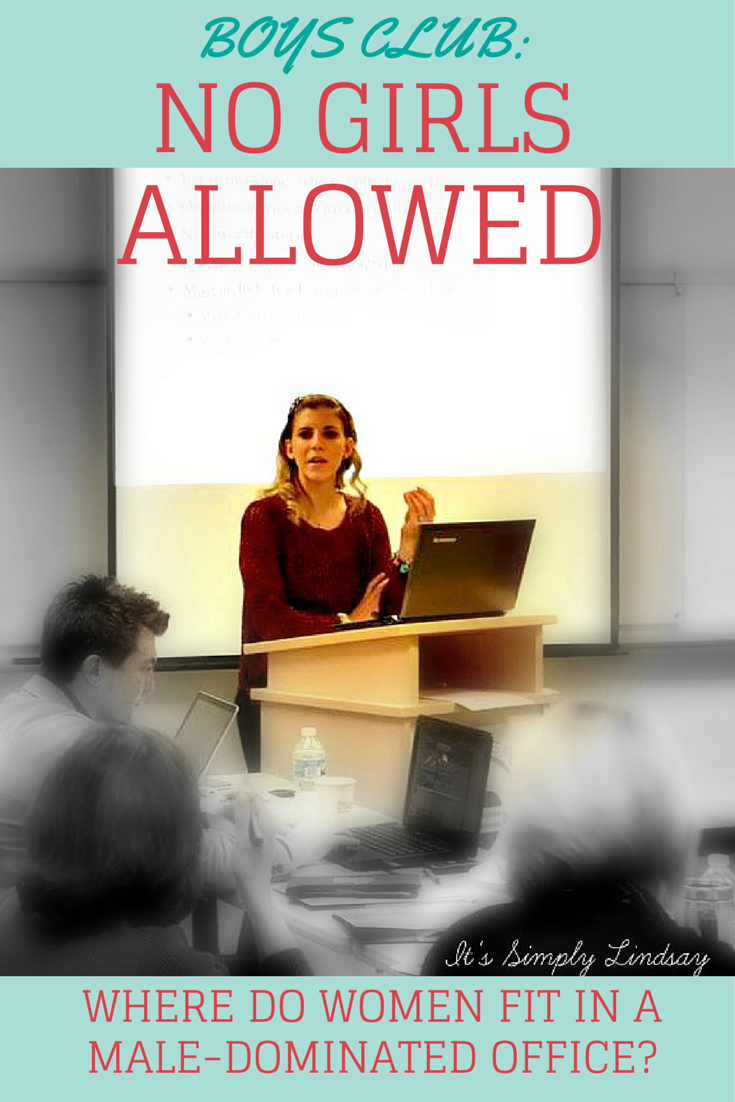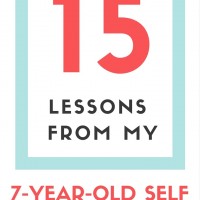
Where do women fit into a male-dominated workplace?
I have been reading various articles of female discrimination in the workplace and couldn’t figure out how to best capture these stories and summarize them all for you. They are such personal, compelling, maddening stories and I feared I wouldn’t be able to properly capture each lady’s tales. After toying with the idea of telling my own story for quite some time, I decided honesty and full disclosure is the best policy. My story may not run as deep or be as severe as many of the articles I read, but it my own. I hesitated to write about my struggles in a past workplace that I truly loved so many things about; I learned a lot about myself, developed strong professional and personal relationships, and had opportunities to showcase my professional abilities. This workplace also became my family. That being said, I’ll share some of the challenges I faced that perhaps shows subtleties of gender discrimination against women. Am I being too sensitive and complaining, or did I have a legitimate reason to feel ostracized? You decide.
Boys Club: No Girls Allowed
After getting my master’s degree in teaching, I could not find a high school teaching position but knew I wanted to work in education. I was fortunate enough to land a job in a school management company, and oddly enough, I was the only woman working in the office. In fact, I was one of two American natives working there, too. In my previous jobs, I worked in female-dominated environments, which presented their joys of womanly bonding and challenges of immature caddiness that really only belongs in middle school. I am not a shy person; in fact, I pride myself on the fact that people liken me to my grandma who is friendly to strangers and has even been known to invite the mailman in for tea. The male-dominated environment I worked in did not intimidate me, and I very much enjoyed the opportunity to learn and embrace the new culture I was immersed in.
My co-workers kept their distance at first, as though I was this strange specimen they didn’t know how to interact with. My desk was out in the open in the middle of the office, so I truly felt like a freak show exhibit that people awkwardly, yet curiously, tip toed around. With my persistent friendliness, willingness to help everyone, and hopeful smile, I slowly ate away at their unsure exterior and quickly grew some of the most cherished professional relationships I have encountered.
I was hired with the title Administrative Assistant, which I felt gave people the impression that my job was to answer phones, distribute mail, and welcome guests. While these did fall under my duties, my primary responsibilities included the following: writing and editing internal/external educational and communication documents, creating and editing e-newsletters for 30 schools, developing and delivering news and marketing pieces to various media channels, writing press releases, speeches and proofreading all documents for internal and external use, managing social media sites, editing test booklets, and developing English Language Arts initiatives and events for our network. Because of my professional and academic background in English, communications, and teaching, I also presented at educational workshops and public relations meetings in my areas of expertise.
But as the young American blonde sitting at the front desk with the plaque “Administrative Assistant” looming (and perhaps mocking) over me, nobody really knew what my daily duties entailed. Disclaimer: there is nothing wrong with the professional title Administrative Assistant, I just felt it did not accurately depict my job. I loved having the ability to show my work ethic by anticipating our communication needs and proactively starting projects I wasn’t even asked to do. I was in my element. Sure, I ate alone at my desk every day, working through lunches, or ate in the basement lunch room with a book to keep me company. Sure, while everyone else took long social breaks, usually involving snacks and tea, I observed from afar. Sure, everyone else had close, personal friendships with one another while I had generic surface conversations for a while, but I was happy. Or was I? No! That was not enough for me.
My active, forceful presence made my co-workers acknowledge me as one of them, and soon I became one of them. I began actually taking lunch breaks with groups of people instead of eating alone. I learned about my co-workers’ families and shared information about my life. I started taking breaks where I would socialize, laugh, and get my mind off work, even for 15 minutes. In an effort to become more healthy, I organized a Biggest Losers-style contest, which turned out to be extremely motivating and successful. Nobody thought the underdog girl had a chance to win in a group of big men, but I lost 30 pounds and won the contest.
This is when things started to get a little tricky for me.
My boss, a very closed-off, intimidating man, called me into his office for a meeting to discuss my clothes. He told me that since I lost weight, my clothes seemed to fit me differently and that it was causing people to notice. I wasn’t quite sure what he was getting at, so I asked for clarification. He said that things fit me in a way that showed off my body that wasn’t appropriate for work. Still confused, I asked him to be more specific. Were my dresses too short? No. Did I wear revealing shirts? No. Were my shoes too high? No.
Of course I knew the answers to all of these because by nature, I dress conservatively- not conservatively to this other culture’s standards, but I feel most confident and comfortable in clothes that aren’t clingy, that move with me, and that I don’t have to constantly pull up or down to feel appropriate. My boss implied that because of my weight loss, perhaps physically I looked better, which he saw as a threat and a problem in such a strict, conservative, non-American culture.
Later I found out that my boss spoke to some of my co-workers and friends about being friendly with me, saying that they should not have lunch with me, that they should not talk to me in their offices, and to overall keep their distance. He inquired if we socialized outside of work and if they had my phone number. While my actual friends continued their professional and personal relationships with me, socializing with one another’s families, and eating together during lunch, I had this constant watchful eye of disapproval and concern looming over me at all times.
After I had been there a year and proved my abilities, I talked to my bosses about some projects I wanted to start, reviewed the work I had done, which went miles above my job description, and inquired about a raise and title change. Although they allowed me to entertain them with the weeks I spent preparing for this meeting with facts, figures, data, and testimonies, that was really all it was- an opportunity for them to be entertained. Nothing changed except my ambition to work even harder to show them what they were missing. I knew I was an invaluable asset to the company; they knew I was an invaluable asset to the company; so why wasn’t I taken seriously?
When year two rolled around, I had another year of professional accomplishments under my belt, spent another few weeks preparing for a meeting I initiated, and calmed my shaking (sweaty) nerves in the bathroom before I entered the meeting a deceptively confident woman. I passed my agendas to my bosses and began the meeting. After listening to me, one of them smugly asked while casually leaning back in the cushy conference chair what it was exactly I wanted. Oh! We’re getting somewhere, I thought. So happy you asked. I provided them handouts of job descriptions of Communication Specialists in our area, highlighting all of the responsibilities we shared. I had done my research thoroughly, and I knew they couldn’t refuse me this time. They loved the work I did; they could count on me to review a 90 page proposal at 9 p.m. on a Friday night; they relied on me to communicate with public officials and knew because of the relationships I established with them, they would attend our events, come to our office for lunch, and be keynote speakers at our workshops. When I was extremely sick, people would call me and I would solve problems from home. The day before my wedding, I took a phone call and snuck in some work; I was loyal to this company and proud of my work- anyone could see that.
I told them a title change seemed appropriate to accurately reflect the level of work I did and told them I would like an office. Because of the location of my desk, I was constantly interrupted, had no privacy, and was subject to constant conversations around me, which is challenging when focusing on writing and editing. I told them I thought it was time for a raise as well. My bosses seemed, again, entertained, as though this meeting I spent so much time preparing for was the sweet, silly antics of a child that they had to listen to in order for me to shut up and go away.
They told me how valuable I was to the company and that I know how much they appreciate the work I do. They told me I was no different than anyone else, and they expressed their disbelief (and was that disgust I detected in that chuckling snort?) that this was the second meeting I initiated in two years requesting such things. Nobody else was requesting such meetings and pointing out their accomplishments, they said, implying I should be more modest and happy with my position.
I clasped my shaking hands and took a deep belly breath to still my quivering voice- quivering from anger and fighting back tears. With my (always) erect posture, I at least appeared confident. I asserted that I am not like everyone else, that I am the only girl, the youngest by far, and one of the only Americans in the office, making me a triple minority. I expressed how I have all of these going against me and how I have had to work extra hard to fit in and prove myself.
They told me there was no money in the budget for a raise.
They told me there was no space to give me an office.
They told me that Administrative Assistant still accurately depicted what I am and couldn’t understand what a title change would prove.
I left, completely defeated. A few weeks later I was offered my dream job; somehow I still felt loyal to this company that had it out for me, but thankfully I took the teaching job and left on happy terms.
What happened when I left? Eight people were hired. My simple position was split into three separate jobs. Where did the office space miraculously come from? How did the budget find salary space for about $345,000 for new employees who hadn’t even demonstrated worth or loyalty to the company?
Federal laws are in place to protect women from discrimination in the workplace, but what happens when the discrimination isn’t so blatant? How can people say that women are not discriminated against when there are thousands of stories of men having this “boys club” mentality, excluding women, and treating them unfairly? Discrimination comes in all forms. No matter the extent or mode of it, the results are debilitating, humiliating, and unfair.
So I ask again- am I being too sensitive and complaining, or did I have a legitimate reason to feel ostracized? You decide.














